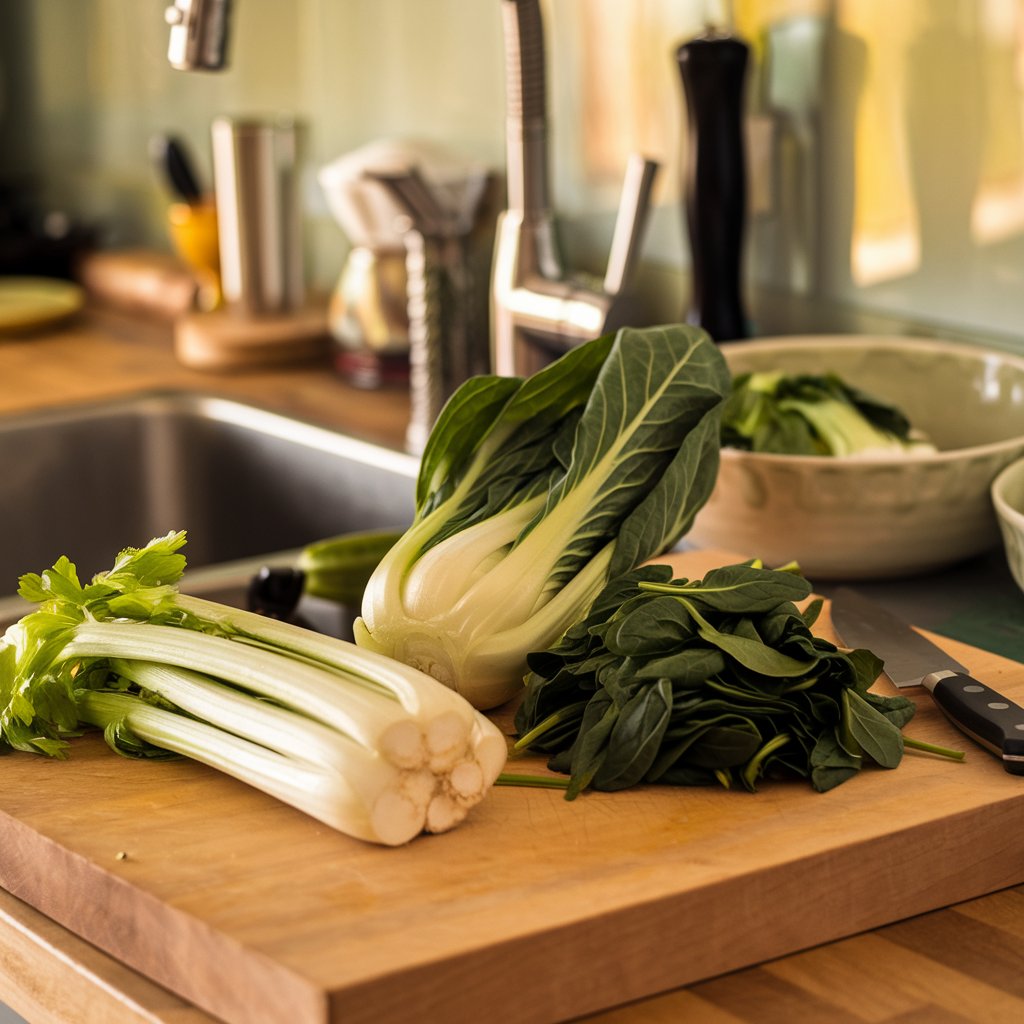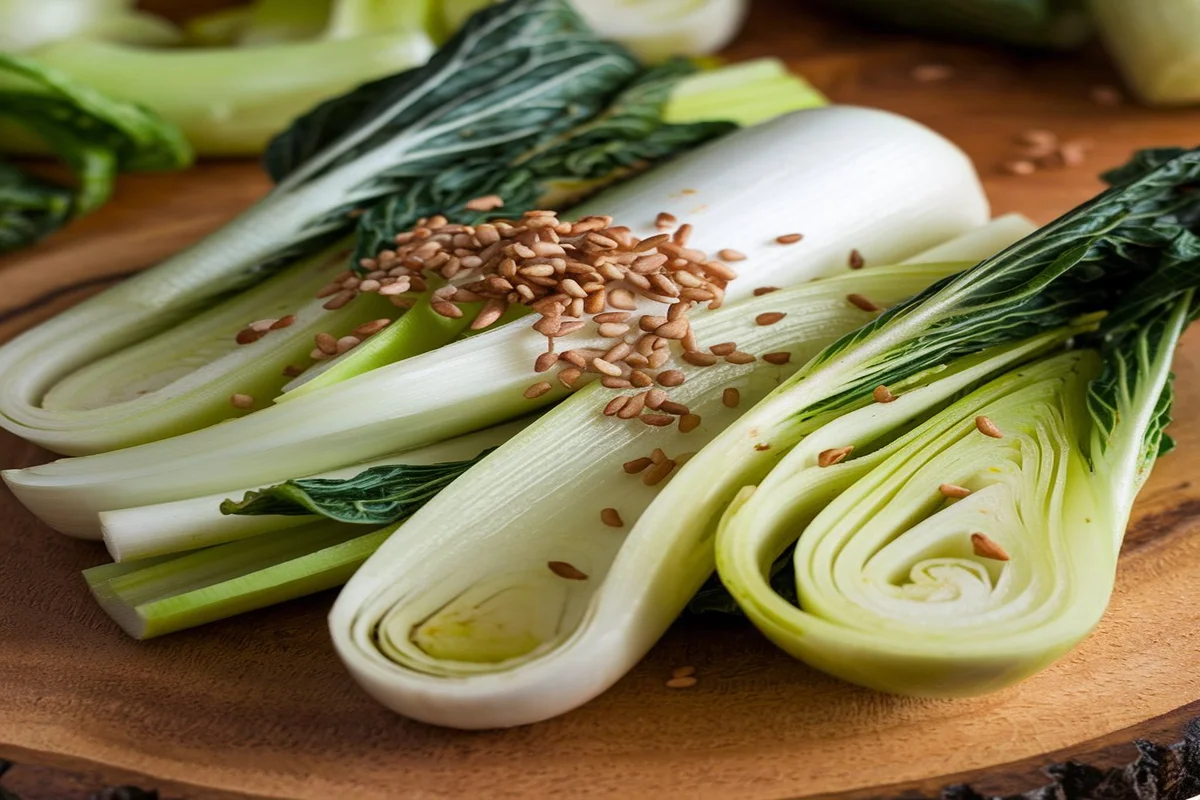Introduction
Bok choy and spinach are two of the most popular leafy greens, each offering unique health benefits. But when it comes to nutrition, which one is healthier? This article will dive deep into the nutritional profiles of bok choy and spinach, comparing their benefits to help you determine which is better suited for your dietary needs. Whether you’re adding these greens to your salads, soups, or stir-fries, understanding their nutritional value is key to making informed choices.
Nutritional Comparison of Bok Choy and Spinach
Macronutrients: Protein, Carbohydrates, and Fats
When comparing the macronutrient profiles of bok choy and spinach, both are low in calories, making them excellent choices for a healthy diet. Spinach, however, contains slightly more protein and dietary fiber, which may give it an edge in digestive health and weight management. Both vegetables are very low in fat, but spinach’s higher fiber content makes it more beneficial for those focusing on digestion and satiety. For those exploring healthy food options, you might also be interested in the best dips that are keto-friendly.

Micronutrients: Vitamins and Minerals
Vitamin A, C, and K Content
Bok choy is a powerhouse of vitamin A and vitamin C, essential for immune function and skin health. It also provides significant amounts of vitamin K, which is crucial for blood clotting and bone health. Spinach offers even higher levels of vitamin K and is a major source of vitamin A. If you’re looking to boost your intake of these vitamins, bok choy and spinach are both excellent choices. For more ideas on incorporating nutrient-rich foods into your meals, check out how to use ramekins for creme brulee.
Calcium, Iron, and Potassium
In terms of minerals, bok choy is an excellent source of calcium, making it a strong contender for supporting bone health. However, spinach surpasses bok choy in iron content, essential for preventing anemia and maintaining healthy blood cells. Spinach also contains more potassium, which is beneficial for heart health and blood pressure regulation. If you’re curious about the best ways to enjoy these vegetables, you might find inspiration in a celery, bok choy, and spinach recipe.
Health Benefits of Bok Choy
Antioxidant Properties
Bok choy is rich in antioxidants, including quercetin, which helps reduce inflammation and protect against oxidative stress. These antioxidants play a critical role in lowering the risk of chronic diseases, such as heart disease and cancer, by neutralizing harmful free radicals.
Heart Health
The high potassium content in bok choy makes it a heart-healthy vegetable. Potassium helps regulate blood pressure, counteracting the effects of sodium. Additionally, bok choy’s low sodium levels further support cardiovascular health.
Bone Health
With its substantial calcium and vitamin K content, bok choy is excellent for maintaining strong bones and preventing osteoporosis. These nutrients work together to promote bone density and reduce the risk of fractures, particularly in older adults.
Health Benefits of Spinach
Rich in Iron
Spinach is celebrated for its high iron content, which is vital for producing hemoglobin and transporting oxygen throughout the body. This makes spinach particularly beneficial for individuals at risk of iron-deficiency anemia.
Eye Health
Spinach is packed with lutein and zeaxanthin, two antioxidants that protect against eye diseases like macular degeneration and cataracts. These nutrients filter harmful light and shield the eyes from oxidative damage, making spinach a top choice for eye health.
Anti-Inflammatory Properties
The antioxidants in spinach, including vitamin C, vitamin E, and beta-carotene, contribute to its strong anti-inflammatory effects. Regular consumption of spinach can help reduce chronic inflammation, which is linked to various diseases such as heart disease, diabetes, and arthritis.
Potential Risks and Considerations
Bok Choy: Thyroid Function and Goitrogens
While bok choy is generally healthy, it contains goitrogens—compounds that can interfere with thyroid function when consumed in large quantities. For most people, moderate consumption poses no risk, but individuals with thyroid conditions should monitor their intake.
Spinach: Oxalates and Kidney Stones
Spinach is high in oxalates, which can contribute to kidney stone formation in susceptible individuals. If you are prone to kidney stones, it’s advisable to moderate your spinach intake and balance it with other low-oxalate greens.
Bok Choy vs. Spinach: Which is Healthier?
Nutritional Density
When comparing overall nutritional density, spinach often edges out bok choy due to its higher content of iron, vitamin K, and other essential nutrients. However, both vegetables are nutrient-dense and offer unique benefits that make them valuable additions to any diet.
Versatility in Diet
Both bok choy and spinach are highly versatile and can be used in a variety of dishes, from salads to stir-fries. Bok choy’s crisp texture makes it perfect for soups and stir-fries, while spinach’s tender leaves are ideal for smoothies, salads, and sautéed dishes.
Cost and Availability
Spinach is more widely available and often less expensive than bok choy, especially in Western countries. However, bok choy is increasingly found in supermarkets and farmers’ markets, making it an accessible option for most people.
Cooking Tips and Recipes
Best Cooking Methods for Bok Choy
To retain the nutrients in bok choy, it’s best to steam or stir-fry it. Avoid overcooking to preserve its crisp texture and delicate flavor. A simple stir-fry with garlic and sesame oil is a delicious way to enjoy bok choy.
Best Cooking Methods for Spinach
Spinach is best consumed raw or lightly cooked to maintain its nutrients. Sautéing spinach with olive oil and garlic enhances its flavor while preserving its nutritional value. Spinach can also be added to smoothies for a quick nutrient boost.
Frequently Asked Questions
Q: Is bok choy or spinach better for weight loss?
Both bok choy and spinach are low in calories and high in fiber, making them excellent choices for weight loss. Spinach’s higher protein content might give it a slight edge for those looking to increase their protein intake while dieting.
Q: Can I eat bok choy and spinach raw?
Yes, both bok choy and spinach can be eaten raw. Bok choy adds a crunchy texture to salads, while spinach is tender and flavorful in any raw dish.
Q: Which has more antioxidants, bok choy or spinach?
Spinach generally contains more antioxidants, particularly lutein and zeaxanthin, which are beneficial for eye health. However, bok choy also has significant antioxidant content, including quercetin, which provides anti-inflammatory benefits.
Q: Are there any foods I should avoid when eating bok choy or spinach?
It’s advisable to avoid consuming large amounts of high-oxalate foods with spinach, especially if you are prone to kidney stones. For bok choy, there are no specific food combinations to avoid, but those with thyroid issues should monitor their intake due to its goitrogen content.
Conclusion
Both bok choy and spinach are exceptionally healthy vegetables, each offering unique benefits. Spinach is particularly rich in iron and antioxidants, making it ideal for those looking to boost their nutrient intake. Bok choy, on the other hand, is a great source of calcium and vitamin A, and is a versatile ingredient that works well in many dishes. Ultimately, including both of these greens in your diet will provide a broad spectrum of nutrients to support overall health.

